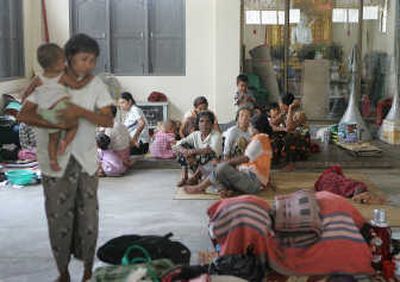Military allows foreign aid in battered Myanmar

YANGON, Myanmar – New rains lashed this capital Thursday as Myanmar’s military junta was only beginning to allow in foreign aid, leaving residents to pay exorbitant prices for bare essentials, bathe in the streets and stew in frustration.
Exploiting shortages caused by damaged roads and ports, profiteers have jacked up prices for supplies such as rice, corrugated sheeting and nails. Back-street gas dealers were charging at least $10 a gallon, more than double the $4-a-gallon cost before Cyclone Nargis struck.
Survivors struggling to recover from last weekend’s catastrophic cyclone got a hint of the coming monsoon season as downpours drenched battered homes and caused new flooding in some streets.
“For the first two or three days, people were in shock. Now anger has set in,” said a local resident working with authorities in an effort to organize privately donated aid here in Myanmar’s largest city. Like most people, he requested anonymity because the slightest hint of criticism risks the generals’ wrath.
After 46 years under military rule, the generals are used to brushing off discontent. But the cyclone delivered a hard blow to the junta’s standing as well as to the rest of the country just days before the scheduled vote on a draft constitution that critics say is a ruse to enshrine military rule.
Neighboring India says it gave the regime two days’ warning that a powerful cyclone was bearing down on Myanmar, also known as Burma. But residents of Yangon say officials here told them to expect winds of 40 mph. Instead, the storm hammered the southern region with 120 mph winds. Five days later, a semblance of normalcy was returning to Yangon. More shops opened, but many remained shuttered, their owners fearful that growing despair would set off a wave of looting.
In the hardest-hit Irrawaddy River delta region, however, there were reports of fights over the scarce aid that’s gotten through. A storm surge of sea water at least 12 feet high wiped out entire villages in the delta region, destroyed rice fields and left hundreds of thousands of people without shelter and little or no food and clean water. Some estimates put the cyclone’s death toll at up to 100,000 people.
The monsoon season, when heavy rain comes almost every day, is due to start in two to three weeks. Most homes left standing by the cyclone lost some or all of their roofs in the storm that hit late Friday and lasted long into Saturday. Planting is supposed to take place by late May in the delta for the September harvest, but about 2,000 square miles remain under water.
In central Yangon, building supply merchants have increased the price more than sevenfold for corrugated iron sheets – from $4 to $30.
“The blood-sucking businesspeople are crazy,” complained a local resident. “Sometimes people go to get some and the seller says, ‘That’s $30.’ Then people reply, ‘I have this much. Either you take my money or you take my knife.’ “